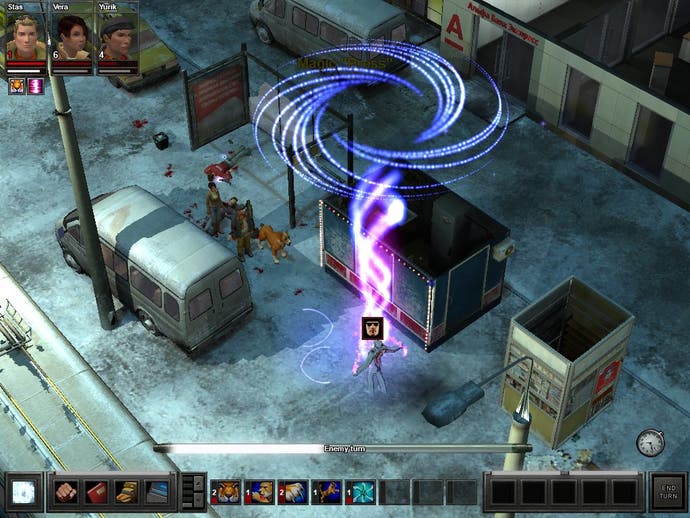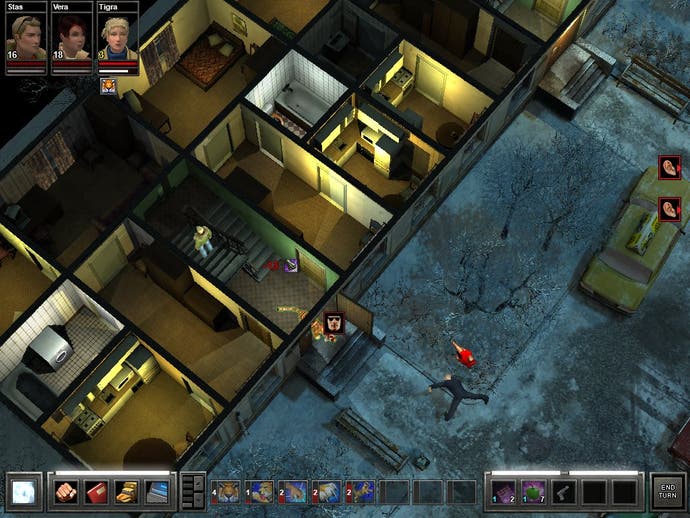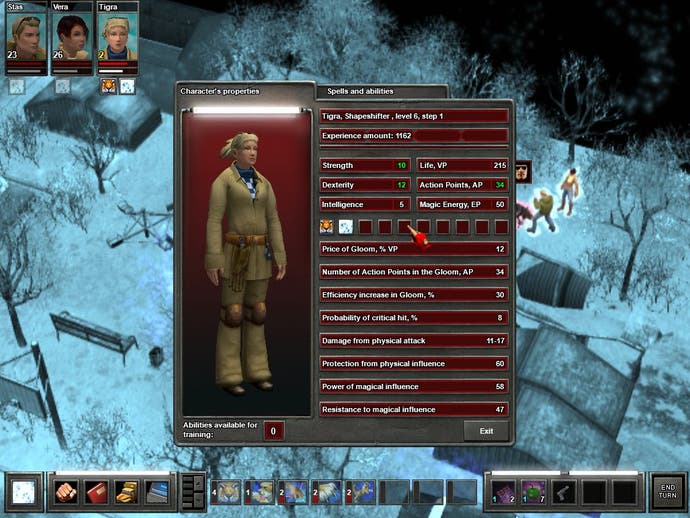Night Watch
Black arts in Red Square.
Right, that's it, no more game-playing for me. From now on I'm just going to read optimistic previews and get my pleasure from anticipation. If I'd done this with Night Watch then the following paragraphs would have been blissfully free of nasty, soul-rotting whinge-words; no 'ill-conceived', no 'woeful', no 'disappointing', no 'hopeless', no 'dire'. The sum-total of Global Negativity wouldn't have been increased by 0.00000000000026%; right now I'd be a fractionally less cynical, less suspicious gamer.
You see Night Watch looked so promising on paper. A modern-day Moscow-based tactical RPG with vampire coppers, lycanthrope gangsters, lots of spell-weaving and fisticuffs - you'd have to be carved out of Siberian salt not to be tempted by a prospect like that. The concept sounded great and the engine - borrowed from mesmerising WW2 firefight game Silent Storm - that was great for sure. All developer Nival had to do was not screw up. As long it didn't strip most of the colour out of the inherited combat system, make its missions dull and prescriptive, and clog the game with tiresome cut-scenes it was onto a winner.
Bolshy Ballet
Well, surprise-surprise, Nival did screw-up. Not massively, not terminally, but NW is a pale midwinter shadow of what it could have been. Take the missions for instance. These, like every element of the game, are inspired by the 'Nochnoy Dozor' books: supernatural thrillers by a Kazakh writer called Sergey Lukyanenko. You lead a group of Night Watch heroes (ordinary Muscovites with supernatural talents and good hearts) through a series of turn-based skirmishes with Day Watch thugs (ordinary Muscovites with supernatural talents and hate-filled hearts). Though there's nothing inherently wrong with the approach, far too many of the scraps are dumped prefabricated into your lap. There you are exploring some atmospheric snow-sprinkled chunk of post-Soviet suburbia when a cut-scene kicks in showing a crowd of enemies approaching. When the clip ends you find yourself ensnared in an unavoidable, toe-to-toe rumble. Spells get traded, fists fly, one side emerges victorious, one is left sprawled on the permafrosty pavement.
This heavy-handed scripting together with the lack of long-range weaponry seriously curtails tactical options. In Silent Storm and its two offshoots (Sentinels and Hammer & Sickle) battles are much more mobile, malleable affairs; folk snipe at each other across levels, there's flanking, charges, retreats and use of cover. In NW it's all wham-kazam-thank-you-mam. Though the sorcery has its subtleties (there are dozens of spells available to each of the three character classes) it desperately needs a longer reach and a more obvious foil. If your adversaries were magic-less and armed with firearms and grenades, then potentially NW would have been a far more interesting game. But then, of course, it wouldn't have been Nochnoy Dozor.
Cadbury Heroes

Loyalty to the source material means the closest thing the Night Watch have to a standard-issue sidearm is a fey flashlight. The crystals can be scavenged, along with numerous other items, from the corpses of the slain. They can also be manufactured by Enchanter characters. The Blue Peter presenters of the Moscow magic scene, this class can transform everyday objects like apples, chocolate bars, spectacles, light bulbs and lottery tickets into useful combat aids and tonics. They can also hex opponents with curses. The most hands-on individuals in the game tend to be the Shapeshifters. Able to temporarily transform into beasts such as tigers, dogs, and wolves, they rely on their paws, claws and maws in brawls. Lastly you've got your Mages, no-nonsense spell-slingers that specialise in traditional wizard tricks like fireball-hurling.
Though you get you to choose the class of new team members introduced during the campaign, there's no opportunity to pick a team before a mission - another missed opportunity. When the scenario designers deign to send all your characters into the same battle then - despite the issues raised earlier - combat does have its appealing intricacies. Once characters have levelled-up a few times and acquired a decent selection of skills and equipment, a thoughtful tactician can execute some clever collaborative plays. During your turn (exploration is real-time, but the action is sliced into turns when enemies are sighted) you can get characters to steal magical energy from opponents then distribute it among their friends. You can heal and remove hexes. Hemmed-in heroes can be aided by knocking back attackers with telekinetic jujitsu.
Making an entrance

The telekinesis spell is one of very few attacks that allows the SS engine to display arguably its finest attribute. One of the joys of Silent Storm was using high explosives and high velocity rounds to vandalise the levels. Everything was destructible meaning you could create your own impromptu doors and trapdoors with grenades. Troops could get blown through holes and windows. Sometimes entire walls collapsed exposing soldiers sheltering within. NW uses the same engine, but doesn't take advantage of the environmental fragility nearly as much as it should. Occasionally a flung friend or foe demolishes a newspaper kiosk or mangles a Lada, but that's about it.
Still, at least the battlegrounds are unusual and evocative. Slushy street scenes, bleak housing estates, echoing Metro stations, chilly parks and playgrounds... it's all deliciously Russian. Given the atmospheric surroundings it's a bit of a shame so much time is spent in the foggy, spectral dimension known as The Gloom. Night and Day Watch operatives can slip into this parallel world at any time, taking advantage of the ambience to enhance sorcery, move stealthily or bypass locked doors. As enemies tend to get Gloomy the second you encounter them, you usually have little option but to follow them in.
Silence is golden

A few more complaints before I nail the coffin-lid shut on NW. Plot-wise, this is an unnecessarily confusing experience. Frequent - too frequent - cut-scenes give the heroes lots of chances to waffle and wisecrack, and allow Nival's storytellers plenty of opportunities to muddy already murky waters. Not a good thing. Occasionally, the confusion even pollutes the missions themselves, poorly articulated objectives leading to aimless wandering. With a spider-shaped campaign, getting stuck wouldn't be such an issue; with the present linear structure you're forced to plug-away manfully until you see the light.
Or you could just quit of course, and go back to playing the superior Silent Storm. SS has its flaws and is woefully short of vampires, magic apples and manimals, but I'd choose it over Night Watch every time. Then again, I guess it is possible SS might not live up to your expectations, especially now I've raised them via this review. Maybe all-things-considered it would be best if you steer clear of that too. Yes, the safest strategy is the one I propounded back at the start. Anticipate upcoming games rather than playing released ones. Perpetual hope is free, and nobody gets hurt.
